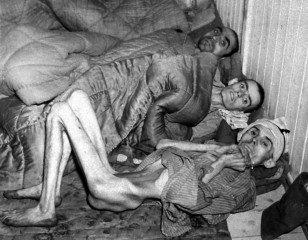Six million Jews.
That staggering estimate of Jewish people who died in the Holocaust, known as the Shoah in Hebrew, still boggles the human mind.
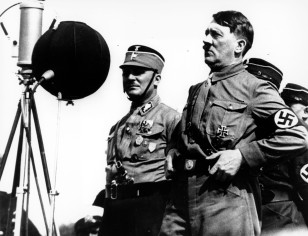
ThIs May 1933 file photo shows German chancellor Adolf Hitler speaking to 30,000 uniformed Nazi storm troopers at Kiel, Germany. (AP)
And yet we know it happened during World War II, during the rise and rule of fascist German Chancellor Adolf Hitler. We have the photos. We have survivors’ stories. We have Hitler’s written words. We have toured the death camps in Europe.
In 1945, 71 years ago today, those imprisoned at Auschwitz-Birkenau, the notorious Nazi camp in southern Poland, were liberated by Soviet Troops. In case we ever forget the potential of humans to commit such a genocide – it has happened since in Rwanda and Cambodia and some say, right now in Syria – we remember the victims of the Holocaust on January 27th.
Obama’s Remarks at the Righteous Among Nations Award Ceremony
In the Age of Trump, Grim Warnings From Survivors
Dana Milbank – The Washington Post
This year’s Holocaust remembrance comes at a time when Donald Trump, the front-runner for the GOP presidential nomination, retweets to his nearly 6 million followers a message from @WhiteGenocideTM based in “Jewmerica,” and a time when his nearest challenger, Ted Cruz, brandishes the endorsement of a minister who says Hitler was a “hunter” sent after the Jews by God….
At this time of open hostility to Muslims in America, museum staff arranged for Johanna Gerechter Neumann, who fled with her family to Albania after Kristallnacht, to talk about how Muslims protected them from Hitler. Her father, a patriotic German and World War I veteran, “certainly thought that it could never happen in Germany,” she said. “It did happen. Slowly, but it did happen.”
And now the aging survivors worry it is beginning, slowly, to happen again.
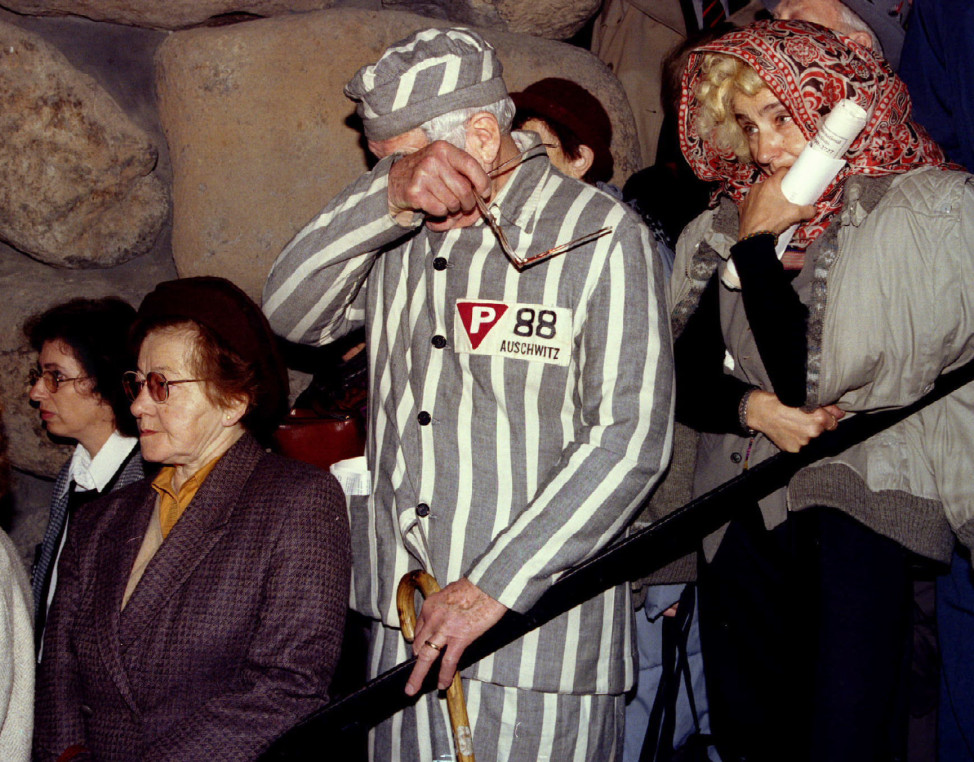
Auschwitz survivor Sigmund Sobolewski, 72, wearing concentration camp clothing, wipes away his tears during a commemorative service at the Yad Vashem Holocaust Memorial, marking the 50th anniversary of the liberation of the Nazi death camp in 1995. (Reuters)
Did Goebbels Win?
Sara Bloomfield – Project Syndicate
The Nazis are gone but propaganda lives on, and its potential is deadlier than ever. As we commemorate the 71st anniversary of the liberation of Auschwitz-Birkenau on January 27, extremist groups around the globe wield new technologies to incite hatred and perpetrate new mass killings and genocides….
In today’s interconnected world, individuals and non-state groups motivated by extremist ideologies can use the power of new technologies to shape attitudes and beliefs, and incite violence on a global scale. Since 2014, the Islamic State (ISIS) has disseminated more than 700 propaganda videos, tailored to various audiences, in all major languages, to maximize the reach and impact of its message….
Bombs and bullets alone cannot defeat political poison. We must also win the battle of ideas.
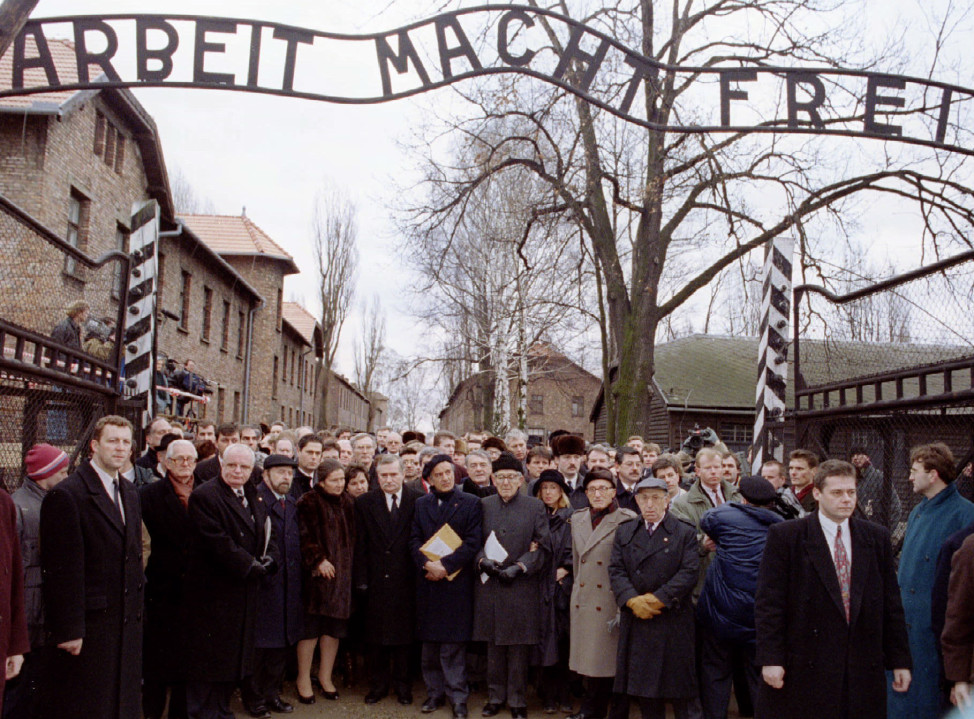
Officials and representatives mourn in silence at the main gate of the Auschwitz concentration camp to mark the 50th anniversary of its liberation on January 27, 1995. (Reuters)
Just One Person Can Make a Difference. My Father and the Shoah
David Roet – Fox News
From the podium of the General Assembly hall [today], my father will read from a postcard sent by his sister Adela on March 12, 1945, a few weeks after Auschwitz was liberated:
‘Dear loved ones, after a most terrible year in the Birkenau concentration camp, my sister Rosientje died in Auschwitz. I was not present. Grandpa and Uncle Isaac were sent to the gas chambers upon arrival on February 2, 1944; Aunt Riek died on April 21, 1943.
“I survived because of willpower, the help of God, the unforgettable home memories of Friday nights and the holidays. Looking everywhere for (my) father, mother and brothers. Looking for assistance to return home soon, to see each other very soon, as soon as possible — Adela’
Although liberated from the death camp, Adela’s frail body could not recover to keep on living. Adela was 20-years-old when she died.
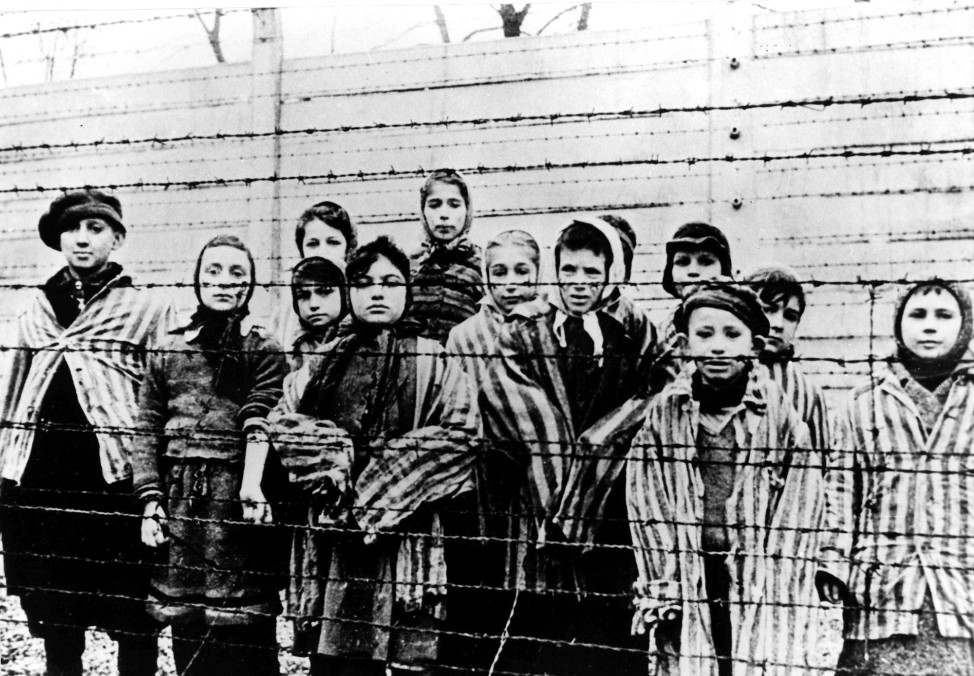
This photo tsken in January 1945, after the liberation by the Soviet army, shows a group of children behind barbed wire fencing in the Auschwitz Nazi concentration camp. (AP)
We Must Honor the Holocaust Survivors’ Stories
Rabbi David Wolpe – Time
Today, on Holocaust Memorial Day, we remember how little we remember. Despite the many movies, books and survivor testimonies, there are the countless stories that have been lost…
Three starved and maltreated prisoners of war huddle together at the Buchenwald concentration camp near Weimar, Germany, in April 1945, just before American troops liberated the camp. (AP)
As anti-Semitism remains widespread and denial still peeks its ugly head above the horizons of history, the emotions that motivate action are more urgent than ever.
The best we can do is an act of intense empathy: to listen with our imaginations as well as our understanding; to realize that however many times we hear the stories they are a small fraction of the totality of the disaster and pain; to remember that the passing of the survivor generation gives us a special responsibility to sustain the memory.
How to Stop the Spread of Anti-Semitism
Avi Benolo – The Star
Earlier this month the Jewish community of France observed the one-year anniversary of the murder of four Parisian Jews at a kosher supermarket.
Following on the heels of the Charlie Hebdo massacre, the killing of these Jews — just because they were Jews — echoed the goal of the Nazi’s Final Solution.
These killings occurred against a backdrop of growing anti-Semitic threats, marches and murders in Europe, as well as the hatred sparked in the Muslim world by the annual Holocaust cartoon contest in Iran. The alarm bells the incident set off have reverberated in Jewish communities around the world.
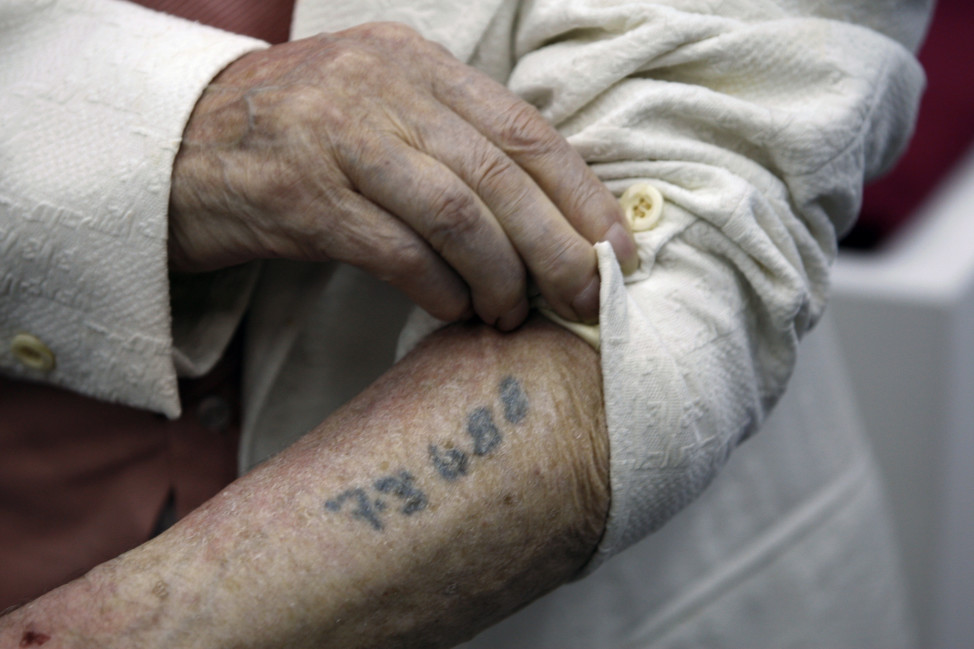
Polish-born Holocaust survivor Meyer Hack shows his prisoner number tattooed on his arm during at the Yad Vashem Holocaust Museum in Jerusalem in this June 2009 file photo. (Reuters)


